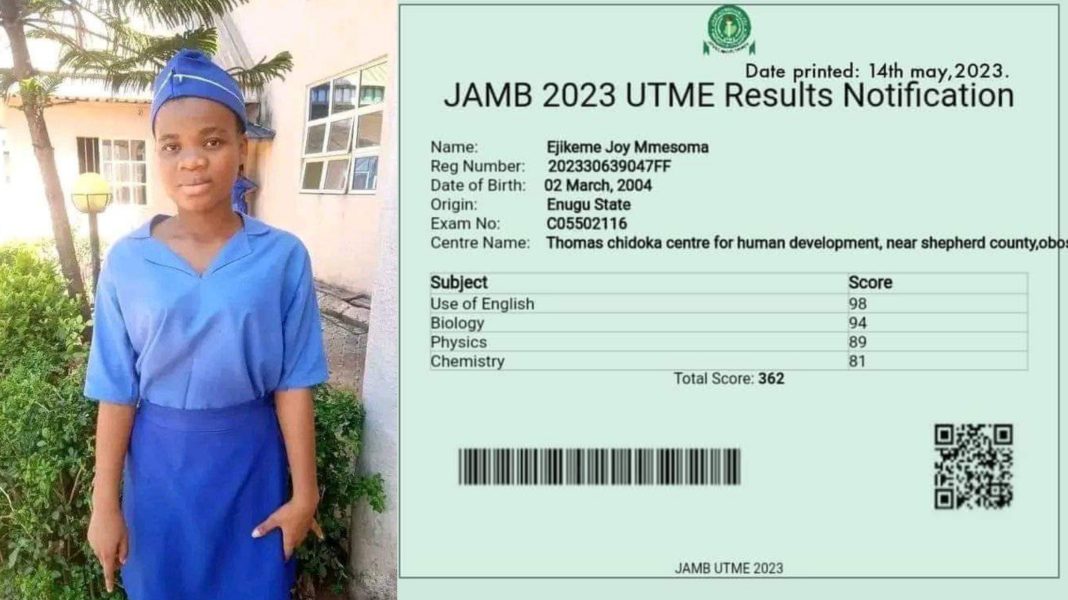Over the last few days, I recoiled in horror and disgust as the fairly straightforward case of JAMB exam result fraud by 19-year-old Mmesoma Ejikeme of the Anglican Girls Secondary School in Nnewi, Anambra State, unwarrantedly intensified Nigeria’s preexisting primordial fractures, deepened a sense of persecution complex among a demographic group, and hardened phobias and hate on social media. It didn’t have to be that way. Here are three lessons from this saga.
One, evidence-free imputation of ulterior motives to the declarations of non-political, non-partisan institutions like the Joint Admissions and Matriculation Board (JAMB) is always a slippery slope that will lead to both real-life and rhetorical wrecks. There was no logical reason to presume that JAMB as an institution had a vested interest in denying the genuine claims to a superlative performance by a poor, unknown candidate like Ejikeme.
If the West African Examination Council, for example, says a result that some nondescript person parades is fake or genuine, it’s best to assume that it probably is—until we have firm, indisputable evidence to doubt the truth of its declaration.
A Facebook lawyer friend by the name of Dorcas Amina Miango (who goes by Ciroman Miango) captured this sentiment best. “If an institution says a document is not theirs, there is a presumption of authenticity in their favour until it is proven otherwise,” she wrote. “That is the law, it is simple. You can make moral arguments but that is not the law.”
The second lesson flows from the first, and it is that not everything is reducible to the politics of ethnicity and religion. It was starkly obvious that the ballyhoo over Miss Ejikeme’s Unified Tertiary Matriculation Examination (UTME) result was refracted through the prism of ethnicity, religion, and partisan politics. Most of the people who threw logic, evidence, and caution to the wind in defense of an obvious fraud by Ejikeme did so because they share the same ethnicity, religion, and region with her.
The enduring divisions in the polity in the aftermath of the last presidential election also influenced how certain people approached the young lady’s exam result fraud. People who have been persuaded that a candidate with some political presence in only 16 of Nigeria’s 36 states (and almost zero presence in 20 votes-rich states) won a national electoral “mandate” that was “stolen” extended their delusions to Ejikeme’s fraudulent claim.
It didn’t matter that the actual best student whose feat JAMB had announced weeks ago shares the same state of origin as Ejikeme. Or that Ejikeme isn’t the only one whose false claim to superior performance in the UTME has been impeached by JAMB.
JAMB’s spokesperson Dr. Fabian Benjamin told the gripping and audacious story of a candidate by the name of John Ifesinachi Chinedu, 19, from Enugu who, in 2021, also claimed to have scored 380 when he actually scored 265.
Like Ejikeme, he falsified his result, accused JAMB of altering it, and hired a well-heeled Enugu lawyer by the name Ikeazor Akaraiwe who demanded that JAMB set a fresh UTME for Chinedu and pay him 1 billion naira in restitutive damages. After JAMB unfurled unimpeachable, foolproof evidence against him, he collapsed like a pack of cards, confessed his fraud, and asked for forgiveness. He was handed over to the police.
Premium Times of July 5 reported other cases such as Kingsley Unekwe, 18, who, in 2019, altered his score from 201 to 269 but was outed by a JAMB investigative panel; an Adah Eche, 18, who fudged his UTME score of 153 to 290 and wrote to JAMB demanding it “correct” his score; a Cletus Kokowa who changed his score from 162 to 206 and later confessed to having paid N10,000 to a crime syndicate to help him electronically alter his score; and a Rejoice Mordi, 19, who changed her score from 164 to 264 and later confessed to getting help for her fraud from WhatsApp through someone identified as Iyanu Oluwa.
Had the Foundation for Investigative Journalism (FIJ) not convincingly shown in a July 4 investigative piece how Ejikeme used a free Google Play app called “JambFun-Fake Jamb Result Maker” to simulate the UTME result she paraded as hers, the debate over her “innocence” and JAMB’s villainy would probably still have been raging.
Unfortunately, even after FIJ has shown how you can create a fake UTME result in a few minutes— and several hilariously fake UTME scores have proliferated on social media using the JambFun-Fake Jamb Result Maker” app— former minister Oby Ezekwesili who stuck out her neck in defense of Ejikeme, tweeted on July 5 that “it should be clear to any reasonable person who cares about Exam Integrity in Nigeria, that more needs to be done to unearth how she obtained the 362-score result which @JAMBHQ disavowed. The Public needs to know these facts through an Independent Technology Investigation.”
An “Independent Technology Investigation” (whatever in the world that means) to find out how Ejikeme downloaded the “JambFun-Fake Jamb Result Maker” app on her phone to generate a fake UTME result? Ha! And this lady was an education minister! It’s true what they say: prejudice distorts what it sees, deceives when it talks, and destroys when it acts.
Ejikeme clearly only forged the UTME result because she wanted to deceive individuals and her state government into funding her university education. No investigation is needed to unearth that. We learned that after getting Innoson Automobile Company to award her a ₦3 million scholarship, she approached the Anambra State government to demand both a recognition of her “feat” and a scholarship.
This was a low-level fraud that had the blessing of her parents—and later the witting and unwitting support of millions of people who share her primordial characteristics. It’s exactly why corruption will be difficult to stamp out in Nigeria.
The last lesson in this, for me, is to learn to never make judgements solely on the basis of surface impressions. A lot of people assumed the innocence of Ejikeme on the basis of her age and looks. Several people also presumed the guilt of JAMB on the basis of their preconceived prejudices about the Registrar of JAMB, Professor Is-haq Oloyede.
Oloyede is a professor of Islamic Studies whose first degree is Arabic. This fact became like a red rag to a bull for a lot of commentators. But the truth is that Professor Oloyede, by all accounts, is the most transformational registrar JAMB has ever had in its existence. Throughout his tenure as registrar, he has ensured that the conduct of UTME every subsequent year is invariably better than the preceding year.
I have never met the man. I am also always reluctant to vouch for people in public office because the intoxication of power and authority can cause people to change without notice. But most people who know the man attest to his unflinching commitment to fairness and justice for everyone irrespective of their faith, ethnicity, or politics.
I have also been told that he is a compulsively methodical, organized, self-critical, and forward-looking person. That was why he had a successful tenure as Vice Chancellor of the University of Ilorin even though he is from Abeokuta in Ogun State—in a time when “outsiders” are not allowed to be VCs of even federal universities. His tenure saw the dramatic rise in the profile of the University of Ilorin.
He has brought that same spirit to JAMB. I am sure he has his foibles, like everyone else, but to judge him on the basis of what he studied and taught and ignore his record is both unfair and unproductive.







